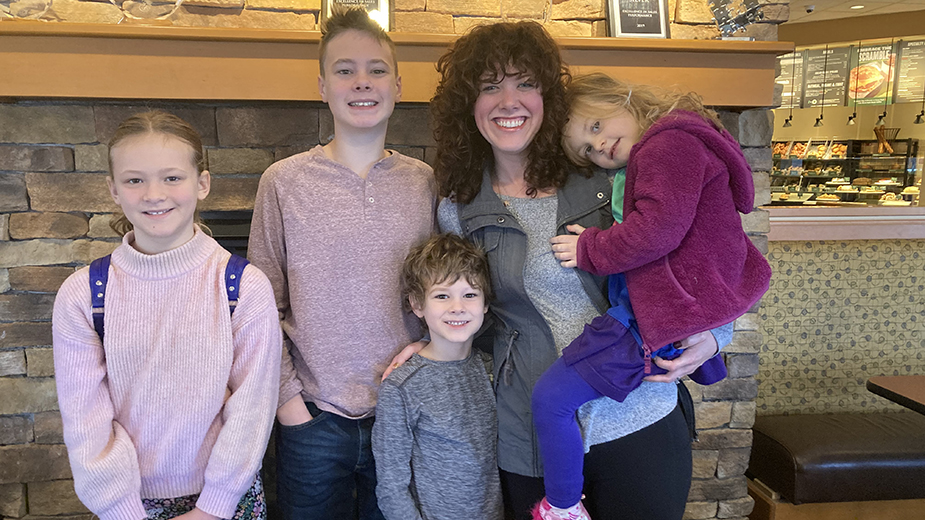YOUNGSTOWN, Ohio – Their reasons vary, but the number of families across the region who choose to homeschool their children is rising.
It’s part of a national trend. The Washington Post reported in October that homeschooling is the fastest- growing form of education across the country.
In Ohio, the number of homeschooled children grew by 54% between the 2017-18 and the 2022-23 school years. In Pennsylvania, the number grew 62% for that same period.
Why Homeschool?
Patty Moliterno of Canfield decided she would homeschool when her oldest child, now 35, was in kindergarten. She has five children, the youngest, 19.
“It was half-day kindergarten and when he would come home, he’d be bouncing off the walls,” she says.
He put so much effort into sitting still in class for half a day, when he got home, he needed to let the pent-up energy out.
Moliterno worried that he would struggle to sit in a classroom a full day. She also wanted to ensure he got the attention he needed.
The family considered a private Christian school that would offer smaller class sizes and align with their religious beliefs.
But her husband was starting a business at the time and the family couldn’t afford private school tuition. She decided to homeschool her son instead.
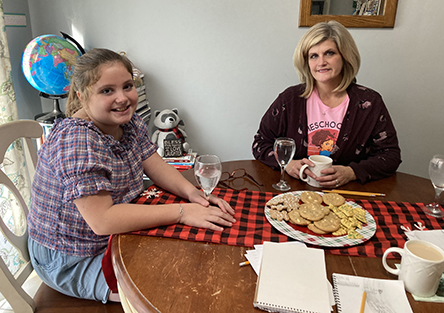
Rachel D’Onofrio of North Lima started homeschooling her daughter, Ellie, 10, when Ellie was in first grade.
“Five days into kindergarten, we had issues with bullying,” D’Onofrio says. “She was 5.”
The next year, a boy pushed Ellie down on the playground.
Ellie was crying when D’Onofrio picked her up from school.
“She started to lose the spark in her eye,” D’Onofrio says of her daughter.
Ellie experienced anxiety about going to school and told people she hated it.
“That kind of set me on my journey to start exploring homeschooling,” she says.
Rachel Fenstermaker of Austintown homeschools her four children, too.
“It was something that was always in the back of my mind,” Fenstermaker says. “Then when we had kids, when our oldest got to be around 6, we started traveling a lot.”
Homeschooling offered a lot of flexibility, allowing travel and learning through that travel.
“It just felt right in that moment to go that direction,” Fenstermaker says.
Growing Number
Corrie David decided to homeschool her children because neither she nor her husband enjoyed school when they were young.
The mother of nine, who lives in Elkton, always knew she wanted to homeschool her children, whose ages range from 3 to 20.
They’re among a growing group.
In Mahoning County, the number of homeschooled children increased by 66% from the 2017-18 to the 2022-23 school year.
In Columbiana and Trumbull counties, the increase was 56.5% and 75%, respectively, over that same time period.
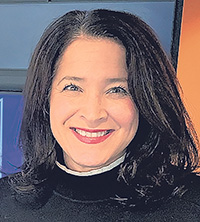
Traci Hostetler, superintendent of the Educational Service Center of Eastern Ohio, attributes the initial upsurge in the number of homeschooled students to the pandemic.
“But there’s a lot of media and negative attention surrounding schools,” Hostetler says.
As a parent, she relates to parents’ fears of sending their children to school where the parents don’t have control of what they may be exposed to.
“When we say that kids have to go to school – it’s required – it takes that control away from parents,” Hostetler says. “I think some people do it to get that control back again.”
As a mother, she understands how scary that could be.
“But [schools] do a darn good job with kids,” she says. “Our schools are as safe as they can be, and I know that we can’t protect our kids forever.”
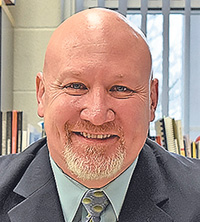
Donald Mook, superintendent of the Columbiana Exempted Village School District, agrees there’s been a lot of negative attention focused on public schools. Some people hear about an incident at a school somewhere in the United States and believe the same thing is happening locally.
“I happen to think rural schools like ours are doing really well,” Mook says. “We’re a 41/2-star district, which is still an A. We’re providing a high-quality service to our public, to our community. I have some teachers who are fantastic, administrators who are unbelievable. But the moment someone doesn’t like something in our schools, they homeschool, they go to private school or they jump the border and go to a neighboring school that has open enrollment.”
Toby Gibson, Brookfield Local Schools superintendent, believes the reasons parents homeschool vary. For some, it may be religious reasons, he says. For others, it may be based on a child’s health.
Hostetler says school districts are affected in many ways when families opt to homeschool.
“First and foremost is the obvious, the financial side of it for schools,” she says.
But when a child is homeschooled through elementary and middle schools and then enrolls in a public school district, there are gaps, Hostetler says.
“And that’s the majority of kids that come back,” she says. “We have tremendous gaps in what the kids who were homeschooled know versus what the kids who went to school know.”
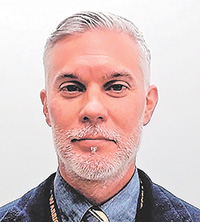
Gibson, the Brookfield superintendent, says the district has encountered difficulty when a student who has been homeschooled enrolls at Brookfield. It’s difficult to know where that student is academically because there aren’t records like those kept by a school. The district must assess the student.
Ohio law doesn’t require homeschooling parents to maintain certain records. The Home School Legal Defense Association, though, recommends in an article on its website that parents keep some records, such as attendance, samples of school work and correspondence with school officials. The website says the proof of education may be helpful when an employer conducts a background check, or a homeschooled student wants to enter the military.
The ESC superintendent acknowledges that there are “wonderful people who are homeschooling,” but there are also people who are homeschooling who don’t take it so seriously.
Educator Concerns
Mahoning Valley educators worry about the ramifications.
In October, the Ohio law regarding homeschooling changed, decreasing requirements. Those who want to homeschool a child must each year notify the superintendent of the district where they live of their plan to homeschool. They must commit to instruction in math, English language arts, science, social studies, history and government.
Before the law change, parents had to provide the curricula they intended to use and submit their intent to provide 900 hours of instruction and samples of the books they would use as curriculum.
“It was the state’s way of ensuring that kids weren’t at home, sitting in front of the television, not engaged,” Hostetler says. “New legislation isn’t so concerned with those things. New legislation is just, parents notify the district that they intend to homeschool, and the district says, ‘Thank you. We received your letter.’”
She has concerns about that change.
“The concerns I have regarding the new homeschooling laws are that we are not able to keep track of children as easily,” Hostetler says. “I think it allows for more people to misbehave if that’s their intention.”
The old law allowed parents to have an idea of what children need at each grade level.
“The intention of the old homeschooling law was never to overreach or challenge what a parent was doing,” Hostetler says. “It was just to keep our pulse that kids are actually receiving something. Their parents are engaged enough in a positive way to ensure that those kids are cared for.”
Hostetler thinks it’s sad that a letter is all that is required now.
Mook points out that to homeschool a child from kindergarten through 12th grade, a parent need only have a high school diploma.
He questions how that compares with professional teachers with master’s degrees who are specialists in their content areas.
There are some circumstances, however, such as a child with severe anxiety, where homeschooling is the best option, Mook says.
How They Started
D’Onofrio emphasizes that a negative event isn’t the sole reason to homeschool.
“I’m not trying to shelter her from the world,” she says. “I always tell people it’s more like a greenhouse where I’m kind of protecting her from some of the elements until she’s ready to handle the world on her own two feet.”
She and the other women researched and reached out to others who homeschooled for tips and information.
David learned about the Christian Home Educators of Ohio and got involved.
“They have a conference every year and 2009 was the first year I went to the conference,” she says. “I found my tribe of people. They were people who were all doing the same things I wanted to be doing.”
Curriculum
There are educational materials designed for children who are being homeschooled and some of the mothers relied on that when they first started.
Later, they tailored the materials and the curricula to their children.
When Fenstermaker decided to homeschool, she joined a Facebook group that connected her to other homeschooling families. She received a lot of encouragement from the group and its members, which was important as she started out.
“When they’re young, learning is an extension of play,” she says. “It was important for me to keep the love of learning there.”
They don’t do a lot of busy work. Children can learn through experiences instead, she says.
“We encourage a lot of reading,” Fenstermaker says. “If they ask a question, I very rarely will answer it if it’s something they can look up.”
She doesn’t have a background in education, but she was a 4.0 student. If she doesn’t know something, she’ll find out.
None of us knows everything, she says. What’s important is being able to find the resources to help. She knows people with knowledge in a variety of subjects and calls on them if she’s struggling with something.
Online tutors are available, too, if any of her children advances to a level where she can’t help.
Critics
The critics range from family and friends who question whether a homeschooled child gets enough socialization to those who ask if a homeschooling parent will send a child to traditional school in the future.
“I’ve learned from other homeschoolers, you just say, ‘We reevaluate every year,’” says D’Onofrio, who has a background in marketing.
Sometimes people who don’t agree with homeschooling quiz homeschooled children to see if they’re learning what they think they should be.
Neither Ellie nor her mother appreciates it.
“Sometimes I just walk away,” Ellie says. “It gets annoying.”
Moliterno says people thought she was crazy when she decided to homeschool.
“You have choices about what church you go to and what sports your child participates in,” she says. “This is just another choice.”
More Family Time
Homeschooling parents point to flexibility as an advantage it affords them.
“We go year-round,” Moliterno says. “It works for our family. We can vacation at different times. If my husband traveled, we could travel with him. We could have dinner together when he got home from work.”
D’Onofrio’s husband works 12-hour swing shifts at a steel mill.
“When he was doing that when she was in school, he’d come home right when I was trying to get her to wind down. She would wind up because he’d be getting home,” she says.
Or he would get home in the morning after an overnight shift and Ellie would already be off to school.
“That’s a big thing for families,” D’Onofrio says. “You can work homeschooling around your life, not your life around school.”
They’re able to structure their day based on what’s best for their children and their children’s learning styles.
It’s similar for Moliterno.
“The best part is the closeness with my kids,” she says. “They’re each other’s best friend.”
D’Onofrio agrees.
“They say it’s over 1,000 hours more per year that you get with your kid,” D’Onofrio says. “I was an older first-time mom. So I guess that’s always made her extra special to me.”
The Fenstermaker children enjoy being with their family, too.
“I just like being able to see my family for the whole day,” says Norah, 9.
She and her brother, Aaron, 12, aren’t interested in attending traditional school.
Sitting for hours in a stuffy classroom isn’t appealing, Aaron says, adding there’s a chance of being bullied.
Norah doesn’t like the idea of being away from her family for so long. The prospect of mean kids and a teacher who doesn’t understand that she has diabetes also turns her off to the idea, she says.
If Ellie wants to go back to traditional school in the future, the family will talk about it.
Right now, though, Ellie isn’t interested. She’s happy being homeschooled.
“You get to spend time with your family and there’s no pressure to catch up or anything like that,” Ellie says.
Her favorite subject is science. She wants to work with animals when she grows up, maybe as a veterinarian.
D’Onofrio did research, reading books about homeschooling and methods to be successful.
Initially, her husband wasn’t sold, but the remote learning at the beginning of the Covid pandemic convinced him.
Homeschooling parents sometimes experience insecurity, worrying if they’re teaching their children the right things, D’Onofrio says.
Her insecurity has lessened but it’s still there.
“We make jokes about it,” she says. “People stereotypically might think that homeschool people are weird or different. But really, it’s not so different now.”
The family meets more and more people who choose homeschooling.
Socialization
One of the issues cited by those critical of homeschooling is a lack of socialization.
Moliterno says her children played recreational sports with children their age and were involved in 4H as forms of socialization.
She also ensured they were exposed to many different experiences.
“We went to the symphony,” Moliterno says. “We traveled. We went to Boston when we were learning about the Revolutionary War.”
The David children were also active in 4H as well as activities at their church.
There are cooperative groups of homeschool families that meet for activities and lessons.
D’Onofrio and Ellie participate in a co-op of about 25 homeschool families called Engage Education Community that meets weekly from 9 a.m. to 2 p.m.
They start the day with music, followed by the Pledge of Allegiance. Then students break off into groups based on their ages.
The Fenstermaker family has participated in co-ops too.
“For me it’s important that they’re able to communicate and socialize with people of all ages, not just their peers,” Fenstermaker says.
The mothers say the advantages of homeschooling far outweigh any challenges.
“What I like about it is that if something’s not working, we can change it up,” D’Onofrio says.
Anybody can homeschool his children, she says.
“We would have a lot more money if I was working full time but at what cost?” D’Onofrio asks. “Someone else would be watching her. She would be doing homework at night. She wouldn’t see her dad as much.”
What children who were homeschooled elect to do after graduating varies.
Moliterno’s oldest son is an attorney, working at the 11th District Court of Appeals in Warren. When he was a student at YSU, Moliterno says the professor told him she wanted to meet his mother because she was impressed with how much the young man knew about history.
Moliterno tailored her son’s education to emphasize his strengths. He enjoyed reading and history and excelled at debate.
Another son and daughter didn’t go to college. Her third son is still figuring out what he wants to do but she believes he will go to college. The youngest, 19, deals with learning delays and Moliterno is helping him to learn life skills.
David says it was left to her children whether they want to attend college. Her oldest will probably enlist in the U.S. Army, she said.
When her children were in high school, she informed them of their options but none seemed eager about attending college, she says.
David attended college, first at Ohio State University and then at YSU.
She changed her major a few times including a period when she studied education. But she’s found that it’s less and less important to have a college degree.
“For all of them, we want them to be financially fit and not in debt,” David says. “If they want to go to college, we’re not opposed to that, but they’re not going to just go without knowing what they want to do.”
Pictured at top: Brittany Fenstermaker of Austintown, poses with her four children, Norah, Aaron, Sammy and Emma. Fenstermaker homeschools her children.
